all of the selves we Have ever been
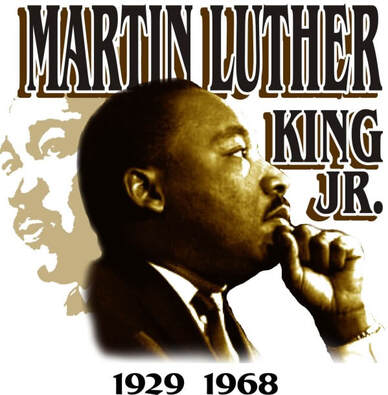 My city is on fire. Does anyone know the way to the Beloved Community? Someone told me about it a long time ago. I was only a child at the time. It was a decade much like this one. Tumultuous. Divisive. Streets filled with protesters. Signs said “peace” and “love” while war, discrimination, and distrust of elders and government fueled flames of despair and burning buildings. A child living in the suburbs, I wondered how close the blaze was to the street where I lived. It was a decade when answering the question of how to put a man on the moon became easier to answer than the question of how to treat a man on the street. We lost a president to assassination. Later, his brother, a presidential candidate and civil rights activist would be gunned down too. Many great leaders of the civil rights movement died by violence even the ones preaching peace and love. We have been wandering through this wilderness longer than Moses and the Israelites. People can only wander for so long. It is hard to live on promises. Like Dorothy on the way to Oz, we don’t really know where we are going. We’ve become distracted. Falling asleep in a field of poppies, we awakened to find we are alone. Where are our brains, our hearts, our courage? There are voices coming over the loudspeaker, but it is all bluster. We are leaderless and on our own. There is no one behind the curtain. Once again, we have set our sights on conquering the heavens. Did we give up on the earth? Does anyone know the way to the Beloved Community? Seeking an answer, I tried Mapquest. The Beloved Community might be in Jersey City, Chicago, Birmingham, St. Louis, Greensboro, or Atlanta. It is hard to find without an address. Without a leader. I must rely now upon the people who know, who remember… I have an old description of the place. A worn pamphlet reports that courageous people live in the Beloved Community. Nonviolence is a way of life. Members of the community seek friendship, understanding, redemption, and reconciliation. Any resistance that exists in the Beloved Community is resistance to evil and injustice not to people. It is a place where suffering educates and transforms without fear of retaliation. People of the Beloved Community choose love instead of hate. They believe that the universe is on the side of justice. I want to be on the side of justice too. Does anyone know the way to the Beloved Community?
0 Comments
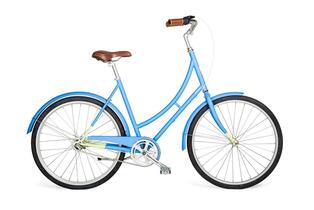 Bicycles have made a big comeback in the age of the coronavirus. They seem to be everywhere—a freedom ticket, a legitimate exemption from the shelter-in-place, social distancing orders. I step outside and notice a mom supervising her toddler. The child is seated aboard a tiny new red and white tricycle. The little girl beams her pride in my direction. Two stubby ponytails bob like small pom-poms on her head cheering on the short legs and chubby feet that tackle the pedals. As I progress down the street, I notice a family coming down the bike path. They are like the gaggles of geese that sometimes bring traffic to a halt on our busy urban road. Dad is in front leading the way. A boy and a girl make up the middle. Mom brings up the rear, keeping a watchful eye on her goslings as they approach an intersection. They are all wearing helmets and obeying traffic rules. I turn down a neighborhood street and notice a driveway cluttered with bikes. There are too many to count. A matching number of boys and girls stretch out on the adjacent lawn—one for each bike. They practice social distancing even as their bicycles mingle and touch on the pavement. Parents chat with their neighbors across the shrubbery. On the return trip home the sun is blazing. An unsupervised six pack of shirtless school age boys zooms past me. Not a one is wearing a helmet. There is probably not a milliliter of sunscreen between them. They are various shades of tan like the rotisserie chickens spinning on the rack at my grocery store. They don’t seem worried. Helmets and sunscreen are things that keep parents awake at night. Children don’t read from the catalog of things that can go wrong. If they did, they would return to the womb and not the bike path. These boys jockey for position on the narrow, two-lane shared-use path. It might as well be the Tour de France sans helmets and uniforms. They keep their eyes on the leader. You can see the look of determination in each sweaty face. Their arms are tense, hands clutching the handlebars. They lean into the wind, wiry legs pumping hard. They are focused! I look at that six pack with envy and think back to the days before exercise became a chore, before we were assigned a number of steps to be tallied at the end of a day—too often a discouraging score. I remember when moving was as natural and vital to existence as breathing. It was freedom. It was fun. I realize that I have not been on a bicycle in years. My life as a pedaler began as toddler too. I received a small red and black train engine called Casey Jones. It was pedal-operated. It didn’t go too fast or too far—up and down the driveway mostly, but I loved that thing. I was as proud a pedaler as the tike I witnessed this morning; I just didn’t have the pom-pom ponytails cheering me on. I soon advanced to a more standard tricycle. While I was mastering my small-fry vehicles, my older sister, Mary, moved up to a very large tricycle. Practically a bicycle built for two. One of us could occupy the seat and the other ride by standing comfortably on the metal sheath that covered the rear axle. Being older, Mary was the first to get a real two-wheeler. It was a teal colored Schwinn, the Gucci of bicycles at the time. I was envious and later followed by acquiring a red Huffy as a birthday present. I was fascinated by the tiny headlamp and the rear rack. My younger brother would later be the first to get a ten-speed with hand brakes. Might as well have been a Lamborghini. Throughout my youth, no one heard of helmets. Often, no one wore shoes. Bicycles were a freedom ticket then too. If you didn’t have a bike, you had to walk. Boring! Parents weren’t about to drive us around in the evening. By day, the cars were at work with our dads. Bikes provided initiative to get out into the world on our own. They were essential to existence. You lacked standing in the world of childhood if you did not have a bike. All was well in our two-wheeled world until the incident. My friend Cindy lived up the hill from us. It was a very steep hill, and she lived one house from the crest. One day she got onto a bicycle in her driveway. She had not yet learned how to ride a two-wheeler. I am not sure if she intended to make her inaugural ride down the hill that day or if the bicycle got away from her. But it happened…she and the bike began moving down the hill gathering speed by the nanosecond. In her wake, Cindy left a trail of screams. We all stood frozen with terror, gravity holding our feet firmly to the pavement. It was not slow motion. In an instant the bike crashed into the guard rail at the bottom of the street. Thankfully, the rail protected Cindy from sailing through the picture window of the house that waited there. When Cindy’s bike collided with the guard rail, she flew into the air coming down hard with her face to the ground. That thump released the force field holding our feet immobilized. Somehow we managed to run and hold our breath at the same time. Today, someone would have called 9-1-1. There would have been an ambulance and a police report. We would have made witness statements. The neighbor into whose yard Cindy flew would be contacting his homeowner’s insurance carrier. But back then, there was no 9-1-1. No dads were home, so no cars were available on the street. We all ran to her, kids and stay-at-home moms alike. When Cindy got to her feet, she dusted herself off. Able to walk, she went on home. Maybe the doctor made a house call. I don’t know. And I don’t know if Cindy suffered any life-long trauma as a result of the incident. I also don’t remember if I rode bikes with Cindy after that day. We did continue to jump rope, play tag, catch lightning bugs, and swap Nancy Drew mysteries. I can’t recall if that day changed my view of bike riding, reduced the pleasure, or increased the fear. Perhaps that was a turning point in my childhood. Maybe it was the day I started my own catalog of things that can go wrong, tucking away my memory of the incident to become “the prime example” I would call upon years later as a parent—on that later day when I would ruin bike riding for my son by insisting he wear a helmet. 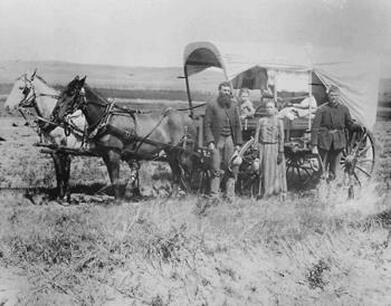 I piddled around the house until almost eleven. Dawdling was not an attempt to avoid work. My morning routine was delayed by the sounds of lawn mowers in the neighborhood. I opened my windows to let in the scent of fresh-cut grass. I love these sounds and smells of summer. They remind me that the world is awake and alive. Like Pavlov’s dog, I was conditioned in childhood to the roar of the lawn mower. I salivate. Must be summer or at least a Saturday. In either case, recess! The lawn mowers began buzzing early in the morning. Folk wisdom says it is best to get at it before the heat of the day sets in. When I was young lawn-mowing was mostly the work of men and occupied a Saturday morning, but as the children grew older, we all got in on the act. There is something about cutting the grass that activates our ancestral DNA, the genetic remnant of our agrarian past, our pioneer spirit fighting the tumbleweeds and clearing the prairie. Whether you stand behind a push mower or sit upon a tractor, mowing the lawn is a way of laying claim to the land and taming the wilderness. It says privilege and home ownership. It suggests accomplishment and permanence. We no longer face the overwhelming obstacles of our pioneer ancestors—harsh climate, unpredictable weather, limited tools, crude shelters, and plagues of grasshoppers, but we are learning something about making our way in the wilderness, facing the unknown, enduring isolation and loneliness. The new coronavirus is like living in unchartered territory with rumors of outlaws and wanted posters plastering the store fronts. It is frightening even if you’ve never seen an outlaw. Just knowing they are out there keeps you vigilant. It is hard to grasp what is in front of you when you are constantly looking over your shoulder. You can’t rest when your dreams are filled with images of bad guys. Despite our fascination with American cowboys and the resilience of the settlers, not all of the pioneers met with success. Some died traveling. Some died trying. Some left busted and disgusted and returned to their homes in the east. The ones that hung in there and faced their trials, endured the loneliness, worked the land despite its difficulties, they are the one who won the west. There have been moments in my life when I’ve thought that I was born at the wrong time. I like physical labor and connection to the earth. I enjoy making things from scratch and putting in a hard day’s work. I don’t mind working alone and having some control over the quality of my work and effort. I’ve had the fleeting thought that I might have been more at home as a pioneer woman. But this coronavirus is testing me. Despite all of that is good and familiar surrounding me, I am pre-occupied with what might go wrong, and the isolation can bring me to the edge of sanity some days. It has been but a few weeks, and I am already busted and disgusted. I hate watching out for bad guys day and night. I could pack up my wagon, but there is no going back; there is no east. I need to get a grip. And a lawn mower. Take back the land. Tame this wilderness. To hell with the bad guys. 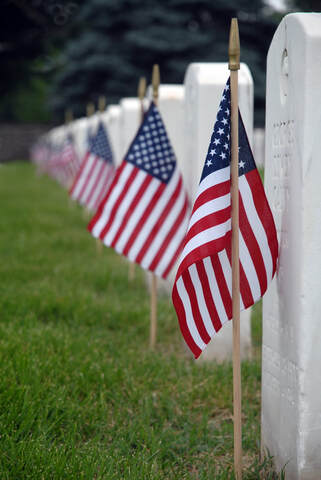 As a life-long student of human behavior, I try to understand evil. I am fascinated by the stories of those who have triumphed over wickedness. How does one endure such horror and live to tell about it? Some years ago an aging Holocaust survivor shared his story with me. A young teenage boy in the Nazi concentration camps, he grew desperate and felt a growing desire to end his life and the terrible daily torment. The boy’s one good fortune was to be in the same camp as his father and to share a bunk with him. The father was a decorated World War I soldier in their homeland. He would not encourage such thoughts in his boy. Each night the father instructed his son to leave their bunk. Together they would lie on the dirt floor with ears pressed to the ground. Through the earth the father could hear the reverberations of distant artillery fire. “The Americans are coming,” whispered the father. On each successive night father and son climbed from their bunk and pressed their ears to the ground. They listened for the echoes of gunfire. The father would estimate the progress of the advancing United States Army. Each night the boy fell asleep to the words that had become like a good night prayer, “the Americans are coming.” And they did. Whenever I am discouraged by politics and bad behavior, I remind myself that I live in the home of the brave. I think of that boy in the camps, of who we are, of what we have accomplished, of our place in the world. “The Americans are coming,” I tell myself. And they will. On this Memorial Day, I remember all those who have survived evil. I remember my Uncle John and Aunt Lillie who served in the war that saved those Holocaust survivors. I remember my father who came after, cousin Al who served in Vietnam, my beloved veterans at the Missouri Veterans Home in Warrensburg, and all those Americans who came whenever and wherever they were needed. Never-ending thanks. 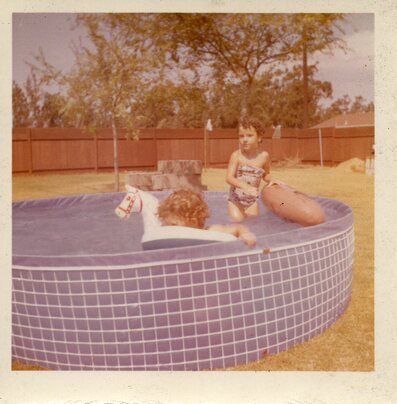 More people are out walking today. At long last the sun has come out and the temperature is rising. A more typical late spring morning has come with the promise that summer is on its way. I pass a broad grassy area where a dog is on its back, paws clawing the air. The pup is wriggling in the cool green grass as if being tickled to death. The pet owner stands back and studies her phone. She waits patiently for her pet. The dog can’t get enough, and his squirming activates the joy switch in passing observers. Everyone smiles. Some laugh out loud. Most slow down. Others stop to watch. There is something contagious here. I study the grass and note the long blades so soft and thick and lush. I want to kick off my shoes and stretch out too, maybe roll down this grassy hillside. I want to capture some of that summer energy, enough to keep me rolling and squealing with joy. Back home I resist the urge to turn on the air conditioner. I draw the blinds and turn on a fan. I think about the time when central air conditioning was a luxury item and uncommon in a household as ordinary as mine. I remember that time when a hot, sweaty child might lie down or roll around in a cool grassy place to escape the heat and wipe off the grime that accumulates without effort on the moist bodies of summer-busy children. There was a routine to summer in the America before air conditioning—open all the windows wide at night even when it was raining. Maybe put a fan in the window to further cool the air. Rise early ahead of the sun, close the drapes and pull the blinds. Pretend you are not home when the sun comes knocking. Indoors, a dark, cool stillness was maintained. As the temperature rose outside, our individual engines went on idle. We tried to minimize any movement that would generate heat indoors. We were cautioned against “running in and out.” Our interior worlds were calm, quiet, cool, and peaceful like a church after the worshippers have gone home. Outside it was fair game to run and play. Barefooted, we stepped off the scalding hot sidewalk into lush green grass. The moisture it contained was like a cool compress. We loved the daring extremes of hot and cold. Later in the day we started the sprinklers or filled the wading pool. The stiff green hose gave us power over the heat. When rest was needed, we could sit beneath a tree or under the cover of a porch or patio roof where we read, colored, or made up tales and argued about what was true and could or could not have happened. The song of the ice cream truck in the distance would get us up and moving, scrambling for change. We stood in the street and enjoyed the delicious dripping, frozen sweetness of red, white and blue popsicles. We loved summer and much of what that season meant—no school, long days, freedom, sprinklers and swimming pools, popsicles and trips to the custard stand. We loved the two worlds of summer. There was our outside world which was full of heat, energy, and activity, the place where we partied with the natural elements. When we were tired, we retreated to our interior world of coolness and calm, soft light and peace. There was a place to run and a place to rest. Each world offered its own kind of reward. There was joy, and there was daring—in running into the heat—and in finding your escape. Never have we had a greater need for a change of season. Come on, summer! We’ve been waiting for you. 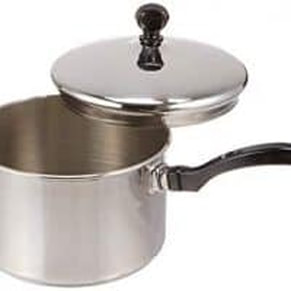 I have a few screws loose. I know what you are thinking, but I am not talking about my head. I am speaking about my pots and pans--a set of stainless steel Farberware that I received as a gift when I first set up housekeeping more than 40 years ago. With the help of some Bar Keeper’s Friend Cleanser, the collection still sparkles like new. Lately, about every two or three weeks, I tighten the screws that join the handles to the pots and pans, but within a few days, subtle wiggles return. I am having trouble accepting this change in condition. These pots and pans have been with me most of my adult life. Every meal ever served in my home has come from inside these familiar vessels. The dutch oven has also served as a health aid at bedside when a stomach was upset. It has been a dish pan, a step stool for tiny feet, a helmet, and a container for Legos. Each pot has taken its turn as a musical instrument and a sorting bin. All have left the kitchen to come and go from the magical world of make believe. These kitchen tools have conjured up cleaning potions, medicinal tonics and Kool-Aid scented play dough. We are a team my pots and me. We have our systems down. Without a measure, the smallest pot and I can fill a favorite tea cup to the brim without a drop of overflow. I know just how long the searing meat can sizzle in the skillet before the roast begins to stick. The bend in the bottom of the largest pot guides my pour of oil as I prepare to make the crunchiest popcorn. We’ve been together a long time. These containers have outlasted countless apartments and two houses. They are well-traveled, moving in state and out. My pots and pans proved sturdier than a marriage, and more reliable than a Rolex. They helped me to feed and rear two children, sharing my memories of warming baby bottles and pancake breakfasts on sleep-over mornings. As one, we have simmered spaghetti sauce and soup to help fill stomachs in households where sorrow has been. In the digital age, we have grown accustomed to constant updates. We no longer expect our things to last. We buy pre-fab furniture and leave it at the curb when we move. Fancy refrigerators and cars that talk to us last just a couple of years before they break down, require an update, or need a part so expensive that we might as well replace them. I am a child of the mechanical age growing up in a household where a washing machine or a television might need a repair, but it lasted a lifetime. Families accumulated fine things not so much by shopping, but by handing down treasured heirlooms to the next generation. There is no bread machine that can replace the carved wooden bowl in which my grandmother kneaded the dough that became her signature raisin bread. There is no fine cabinetry that can replace the worn butcher block on which my grandfather cut meat in a small grocery store that helped feed a community during the Great Depression. I love things that last--familiar things that share my memories and tell a story. Perhaps I will lose my mind on that day when the screws finally fall from the handles of my old pots and pans. 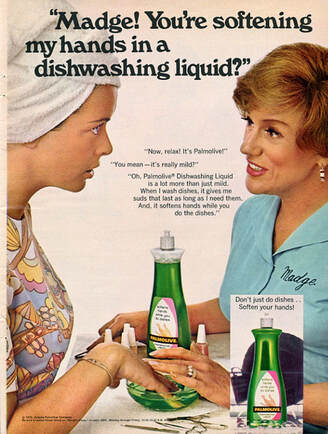 Madge. That’s not a name you hear often. The only Madge I ever knew was Madge the Manicurist. She surprised her customers by revealing to them that their hands were soaking in Palmolive, the product that “softens hands while you do dishes.” Madge became a familiar face to me at a time in my youth when I did not know any real women who went for regular manicures at nail salons. Madge was ahead of her time! I’ve been thinking of Madge during this pandemic. My hands are regularly soaking in dish detergent, liquid Lysol, Clorox Wipes, and a variety of antibacterial soaps and hand sanitizers. I wouldn’t say that any of these products are “gentle.” And I would not say my hands have softened while soaking. In fact, the flesh around my fingernails is dissolving right along with the microbes being killed by my inventory of sanitizing products. Where is Madge when you need her? Perhaps she’s hooked up with Mr. Whipple in that heavenly supermarket in the sky, the one with the well-stocked, orderly toilet paper aisle. I assume they must have met when Mr. Whipple was a store manager and Madge was shopping for her Palmolive. With toilet paper returning to the shelves and nail salons re-opening, I have been thinking about both Mr. Whipple and Madge. I have been thinking of them because of toilet paper shortages and raggedy fingernails and because of a certain lesson their lives contain about re-invention and unexpected outcomes. In this time when the future seems so uncertain, especially as it pertains to work and the economy, I think about Madge’s lengthy and real life career as Jan Miner the stage actress, and Mr. Whipple’s true identity as Dick Wilson the actor who played in 38 films. Without research, I cannot name a single play that starred Jan Miner or a single film in which Dick Wilson played a role, but I will never forget Madge or Mr. Whipple. Their longest running gigs and greatest celebrity came from those commercials—selling soap and toilet paper. Mr. Whipple starred in 500 Charmin commercials. Madge was a regular in our lives softening hands from 1966 until 1992. We are living in an uncertain time, a time of re-invention. Maybe what we’ve prepared for, what we’ve always done will continue to work out. Maybe it won’t. Sometimes life takes a turn and leads us to a supermarket aisle or nail salon. There are times when what seems minor or unimportant becomes essential, even extraordinary. Humble jobs can become exalted positions. And we never forget life’s teachers, the people with familiar faces who provide us with reassuring, consistent, and reliable messages even if the message is about how to handle toilet paper or soften our hands while we work. |
AuthorLilli-ann Buffin Archives
July 2024
Categories
All
|
 RSS Feed
RSS Feed